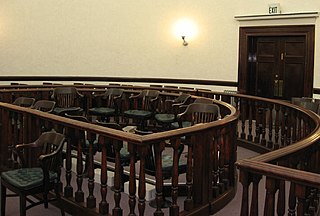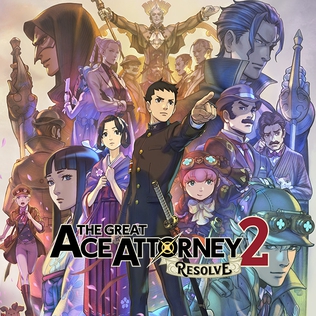Jury instructions, also known as charges or directions, are a set of legal guidelines given by a judge to a jury in a court of law. They are an important procedural step in a trial by jury, and as such are a cornerstone of criminal process in many common law countries.

A jury trial, or trial by jury, is a legal proceeding in which a jury makes a decision or findings of fact. It is distinguished from a bench trial, in which a judge or panel of judges makes all decisions.

Cluedo, known as Clue in North America, is a murder mystery game for three to six players that was devised in 1943 by British board game designer Anthony E. Pratt. The game was first manufactured by Waddingtons in the United Kingdom in 1949. Since then, it has been relaunched and updated several times, and it is currently owned and published by the American game and toy company Hasbro.

A jury is a sworn body of people (jurors) convened to hear evidence, make findings of fact, and render an impartial verdict officially submitted to them by a court, or to set a penalty or judgment. Most trial juries are "petit juries", and usually consist of twelve people. A larger jury known as a grand jury has been used to investigate potential crimes and render indictments against suspects.

A whodunit is a complex plot-driven variety of detective fiction in which the puzzle regarding who committed the crime is the main focus. The reader or viewer is provided with the clues to the case, from which the identity of the perpetrator may be deduced before the story provides the revelation itself at its climax. The investigation is usually conducted by an eccentric, amateur, or semi-professional detective.
Jury nullification, also known in the United Kingdom as jury equity, or a perverse verdict, is when the jury in a criminal trial gives a verdict of not guilty even though they think a defendant has broken the law. The jury's reasons may include the belief that the law itself is unjust, that the prosecutor has misapplied the law in the defendant's case, that the punishment for breaking the law is too harsh, or general frustrations with the criminal justice system. Some juries have also refused to convict due to their own prejudices in favor of the defendant. Such verdicts are possible because a jury has an absolute right to return any verdict it chooses. Nullification is not an official part of criminal procedure but is the logical consequence of two rules governing the systems in which it exists:
- Jurors cannot be punished for passing an incorrect verdict.
- In many jurisdictions, a defendant who is acquitted cannot be tried a second time for the same offense.

The Scottsboro Boys were nine African American male teenagers accused of raping two white women in 1931. The landmark set of legal cases from this incident dealt with racism and the right to a fair trial. The cases included a lynch mob before the suspects had been indicted, all-white juries, rushed trials, and disruptive mobs. It is commonly cited as an example of a legal injustice in the United States legal system.

In law, a verdict is the formal finding of fact made by a jury on matters or questions submitted to the jury by a judge. In a bench trial, the judge's decision near the end of the trial is simply referred to as a finding. In England and Wales, a coroner's findings used to be called verdicts but are, since 2009, called conclusions.

A murder mystery game is a type of party game in which players investigate and solve fictitious murders. In many variations, a player secretly plays as a murderer while the others attempt to determine the murderer's identity.

The CSI effect describes the various ways in which the exaggerated portrayal of forensic science on crime television shows such as CSI: Crime Scene Investigation influences public perception. The term was first reported in a 2004 USA Today article describing the effect being made on trial jurors by television programs featuring forensic science.
221B Baker Street: The Master Detective Game is a board game featuring Arthur Conan Doyle's fictional detective Sherlock Holmes and developed by Jay Moriarty in 1975 and sold by the John N. Hansen Co. in the US since 1977. The players have to solve cases using the clues provided by visiting locations on the board such as 221B Baker Street, Scotland Yard, Apothecary and Pawn Broker.
Trial advocacy is the branch of knowledge concerned with making attorneys and other advocates more effective in trial proceedings. Trial advocacy is an essential trade skill for litigators and is taught in law schools and continuing legal education programs. It may also be taught in primary, secondary, and undergraduate schools, usually as a mock trial elective.
No case for the defendant to answer is a term in the criminal law of some Commonwealth states, whereby a defendant seeks acquittal without having to present a defence, because of the insufficiency of the prosecution's case. The motion is infrequently used in civil cases where the defendant asserts that the plaintiff's case is insufficient to prove liability.

Ace Attorney Investigations: Miles Edgeworth is a 2009 adventure video game developed and published by Capcom. It was originally released for the Nintendo DS in Japan in 2009, and internationally in 2010, and later for iOS and Android in 2017. It is the fifth game in the Ace Attorney series, and is set between the events of the third and fourth games, Phoenix Wright: Ace Attorney – Trials and Tribulations and Apollo Justice: Ace Attorney.
United States criminal procedure derives from several sources of law: the baseline protections of the United States Constitution; federal and state statutes; federal and state rules of criminal procedure ; and state and federal case law. Criminal procedures are distinct from civil procedures in the US.
The Double Jeopardy Clause of the Fifth Amendment to the United States Constitution provides: "[N]or shall any person be subject for the same offence to be twice put in jeopardy of life or limb..." The four essential protections included are prohibitions against, for the same offense:
Rolando Cruz is an American man known for having been wrongfully convicted and sentenced to death, along with co-defendant Alejandro Hernandez, for the 1983 kidnapping, rape, and murder of 10-year-old Jeanine Nicarico in DuPage County, Illinois. The police had no substantive physical evidence linking the two men to the crime. Their first trial was jointly in 1987, and their statements were used against each other and a third defendant.

R v Dudley and Stephens (1884) 14 QBD 273, DC is a leading English criminal case which established a precedent throughout the common law world that necessity is not a defence to a charge of murder. The case concerned survival cannibalism following a shipwreck, and its purported justification on the basis of a custom of the sea.

The Great Ace Attorney 2: Resolve is an adventure game that serves as the tenth installment of the Ace Attorney series and the sequel to The Great Ace Attorney: Adventures, developed and published by Capcom. It was directed by Shu Takumi and produced by Motohide Eshiro. The game was released for the Nintendo 3DS in Japan in August 2017, with Android and iOS versions following in April 2018. Resolve was released worldwide in July 2021 via The Great Ace Attorney Chronicles, a duology compilation of both games for Nintendo Switch, PlayStation 4, and Windows.
As one of the fifty states of the United States, California follows common law criminal procedure. The principal source of law for California criminal procedure is the California Penal Code, Part 2, "Of Criminal Procedure."











